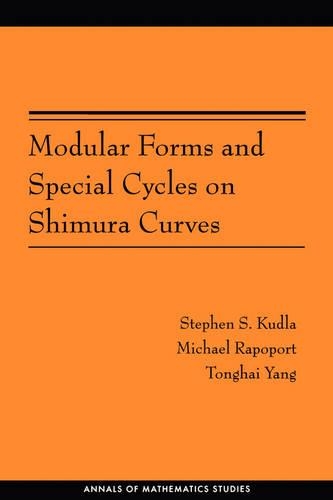
Modular Forms and Special Cycles on Shimura Curves. (AM-161)
(Paperback)
Publishing Details
Modular Forms and Special Cycles on Shimura Curves. (AM-161)
By (Author) Stephen S. Kudla
By (author) Michael Rapoport
By (author) Tonghai Yang
Princeton University Press
Princeton University Press
3rd July 2006
United States
Classifications
Professional and Scholarly
Non Fiction
Functional analysis and transforms
512.7
Physical Properties
Paperback
392
Width 152mm, Height 235mm
539g
Description
Modular Forms and Special Cycles on Shimura Curves is a thorough study of the generating functions constructed from special cycles, both divisors and zero-cycles, on the arithmetic surface "M" attached to a Shimura curve "M" over the field of rational numbers. These generating functions are shown to be the q-expansions of modular forms and Siegel modular forms of genus two respectively, valued in the Gillet-Soule arithmetic Chow groups of "M". The two types of generating functions are related via an arithmetic inner product formula. In addition, an analogue of the classical Siegel-Weil formula identifies the generating function for zero-cycles as the central derivative of a Siegel Eisenstein series. As an application, an arithmetic analogue of the Shimura-Waldspurger correspondence is constructed, carrying holomorphic cusp forms of weight 3/2 to classes in the Mordell-Weil group of "M". In certain cases, the nonvanishing of this correspondence is related to the central derivative of the standard L-function for a modular form of weight 2. These results depend on a novel mixture of modular forms and arithmetic geometry and should provide a paradigm for further investigations.The proofs involve a wide range of techniques, including arithmetic intersection theory, the arithmetic adjunction formula, representation densities of quadratic forms, deformation theory of p-divisible groups, p-adic uniformization, the Weil representation, the local and global theta correspondence, and the doubling integral representation of L-functions.
Reviews
"This book represents a major milestone for research at the intersection of arithmetic geometry and automorphic forms. The results will shape the research in this area for some time to come."--Jens Funke, Mathematical Reviews
Author Bio
Stephen S. Kudla is at the University of Maryland. Michael Rapoport is at the Mathematisches Institut der Universitat, Bonn, Germany. Tonghai Yang is at the University of Wisconsin, Madison.
